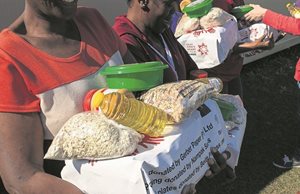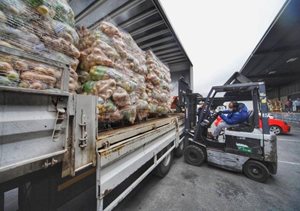






When the Covid-19 pandemic surprised the world with the magnitude of exponential proportions, most countries and most citizens were completely unprepared for what happened next.
The introduction of preventative measures and the washing of hands was thought to be an inconvenience, but the scenario of a total lockdown of almost a global scale was not even considered. Yet, this is what happened.
This is the time we were asked to enter the fray. We responded to a very simple need: The need to coordinate the data of care of thousands of people caught in the jaws of lockdown. And coordination really makes sense. Where many Care Based Organisations (CBOs) had to work hand-in-hand with each other, coordinating with security forces, donors, local government structures, and logistics companies, the conditions for "stepping on each other's toes" were perfect.
The real problems

To add to the whirlwind and confusion, suddenly all NGOs and NPOs were now delivering food parcels to needy families. And that is where the real problems came into focus. As one NGO would have been involved in local entrepreneurship development, and another caring for child-led homes, whilst yet another would be focused on social justice or abused women, there was an obvious overlap of people on lists.
The magnitude of the overlap between these lists of people was just over 38% when they were captured. This meant, in practice, that one family, being on multiple lists for different reasons, now found themselves on multiple lists for a singular reason: Getting a food parcel.
However, the fact that the list existed for a specific purpose, meant that most CBOs were very protective of their lists. And now, as their lists proved to be a driver of income, it meant that competitiveness of names on lists developed, or rather, was amplified.
Suddenly, the identity of a person was lost and became a number. Unfortunately, the donors and organisations that responded with humanitarian hearts added to the problem whilst believing that they were part of the solution. The very simple decision to monetise the process and not the outcome created a systemic issue. Let me explain: The old adage of "You get what you pay for" or "You get what you incentivise" applies. If you choose to pay for the process, the natural response of people would be to maximise the payment in the process.

When the Dead Sea Scrolls were found in the Qumran Caves in 1946 this lesson was learned the hard way. In order to maximise the finding and collecting of archaeological items, the process was incentivised. For every scrap that was brought to the archaeologists, the volunteer was paid for. The Bedouins quickly maximised their position: When they found an intact item, they tore it up in many bits and were paid for each. Not only were invaluable ancient artefacts destroyed, but the subsequent effort of putting Humpty Dumpty together again cost millions.

What resulted in townships were the following: Some families received lots and others received nothing at all. Meanwhile, the NGOs were "pocketing it". Being paid anything from R100 to R250 to deliver a parcel to a family, it was easy to stack up the numbers. As an example, one NPO claimed to have distributed 7000 parcels. Each weighed 70kg. Simple calculation: They delivered 490 tons of food. Yet, when talking to the distribution centre, they only received 64 tons. In actual fact, they only delivered 914 parcels. Yet they got paid for 7000! Nice.
Survival tactics
Let's be open about this: People are people. Irrespective of where they come from and what their background is, when something is freely given, people will take what they can. Having been an observer of food aid to a middle-class family, it was sad to see that their temporary food aid continued long after they once again found employment and could adequately sustain themselves.
So, there is no blame to be gamed by criticising the families who received multiple parcels. They were merely and naturally optimising their own positions. Some even started selling their excess and multiple parcels were found in food kitchens - using free goods as a wonderful boon of supply to sell cooked meals to hungry clients.
A logical extension would be this: NGOs are also people, run by people, staffed by people, and prone to all of the limitations of our impoverished human condition. However, NGOs should strive to be better.
Unfortunately, even though there was little overlap in their roles initially, the new overlaps created explicit partisan behaviour. Suddenly, the implicit focus on a group became an explicit scream of "turf". Willingness to share information went from difficult to improbable to "definitely not" in days. Now we see that volunteers who risk life and health to collect names of beneficiaries are enticed to "sell" their lists to the big (well-funded) NGOs. For the bigger want to be fatter, to be quite blunt.
On the other hand, the donors are steadily (and blissfully ignorant of what is happening) supplying goods into the communities. Some goods are "sequestered" by local politicos, dedicating care to "their lists" - that is, card-carry party members. Other NGOs are publicly resisted and even ridiculed for playing to "another political parties' agenda".
And, yes, the racial divide widened as white care workers who have been involved in the community for decades were suddenly politicised. Even though little of it makes sense at the incidental level, it makes sense at the systemic level. Working together and seeing the people as the beneficiaries of care, maximising efficiencies to these desperate people, and ensuring that effort is minimised and outcome optimised is most difficult to manage against this accepted norm of "separateness".

A very good example is the care of foreigners. Not eligible for any of the grants given by the Government, they are the most vulnerable of all. Against a backdrop of the xenophobic mindset of South Africans, it was clearly communicated by some that only citizens should receive aid. Irrespective of the fact that humanitarian aid contains the word "human", that is, all people, equally, at a practical level this is sadly overpowered by inequality. We are now seeing food riots in places. We are seeing an increase in social risk. But are we hearing the tearing of the fabric of our society?
Which is why the comment is valid that NGOs, the very people that should be better at this, has devolved to a new 2020 version of Apartheid. You can go through the tick-list yourself. "Human" rights abuses. Tick. Separateness. Tick. Institutional coldness. Tick. Administrative mechanisms to enforce and sustain separateness. Tick. Lack of tolerance. Tick. Inequality in accessing resources. Tick. Perhaps it is not "institutionalised" as a governmental model through policies, but it is decidedly "Apartheid of the mind".
Yes, we are in the fray. This is a military term. We are waging a war against corruption, against inequality and for social justice and optimising care to all. Equally. Perhaps we sound like "Care Freedom Fighters" or "Social Justice Warriors". Perhaps we are. But perhaps we were called for a day like this.